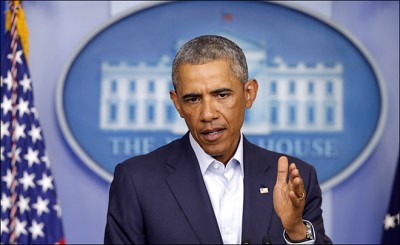Obama’s Brutal War on the Press: “Pentagon Manual Calls for Treating Journalists as ‘Unprivileged Belligerents.’”

Pentagon manual calls for potentially treating journalists like ‘unprivileged belligerents.’
It’s well documented that President Barack Obama’s administration has been brutal in targeting whistleblowers who leak information to the press. The Department of Justice has spied on the Associated Press and Fox News to track down sources of information. It has slid down the World Press Freedom Index to 49th place, lower than several African and South American countries.
Now a new Pentagon document, a Law of War Manual, states that journalists can be treated like “unprivileged belligerents,” which is apparently the new term for “unlawful combatants,” which some may recall was the new term for “suspected terrorists.”
According to some media coverage of the manual, military leaders are insisting they’re not declaring that journalists are the enemy. Rather they’re pointing out that journalists just might be the actual enemy, as in terrorists, spies, and propagandists posing as journalists.
The Committee to Protect Journalists, however, is concerned that the vagueness of the manual will give clearance to the military to detain and harass journalists with very little evidence that they’re doing anything but honest reporting:
This broad and poorly defined category gives U.S. military commanders across all services the purported right to at least detain journalists without charge, and without any apparent need to show evidence or bring a suspect to trial. The Obama administration’s Defense Department appears to have taken the ill-defined practices begun under the Bush administration during the War on Terror and codified them to formally govern the way U.S. military forces treat journalists covering conflicts.
The manual’s impact overseas, especially in the short run, may be even worse. The language used to justify treating journalists as “unprivileged belligerents” comes at a time when international law for conflict is being flouted by armed groups–including government, militia, and insurgent forces–from Ukraine and Iraq to Nigeria and the Congo–and during a time in which CPJ has documented record numbers of journalists being imprisoned and killed. At a time when international leadership on human rights and press freedom is most needed, the Pentagon has produced a self-serving document that is unfortunately helping to lower the bar.
And the bar is apparently already pretty low:
The U.S. military has taken action against journalists before. Bilal Hussein, whose photo of insurgents firing on U.S. soldiers in Fallujah in 2004 helped earn Associated Press photographers, including Hussein, the Pulitzer Prize, was detained by Marines in 2006 and held for two years. The U.S. military never provided evidence or an explanation for the detention of the AP photographer, who was presented with CPJ’s International Press Freedom Award in 2008.
Sami al-Haj, an Al-Jazeera cameraman, was detained in December 2001 by Pakistani forces along the Afghan-Pakistani border while covering a U.S.-led offensive against the Taliban in Afghanistan. U.S. military forces accused the Sudanese cameraman of being a financial courier for armed groups and assisting al-Qaeda and extremist figures, but never provided evidence to support the claims, CPJ found in its 2006 report “Sami al-Haj: The Enemy?” Al-Haj, who is now is head of the human rights and public liberties department at Al-Jazeera, was held for six years at the U.S. military base in Guantanamo, Cuba. Prior to releasing him, U.S. military officials tried to compel al-Haj to agree to spy on Al-Jazeera as a condition of his release, his lawyer, Clive Stafford Smith, told CPJ and media outlets.
The New York Times‘ Editorial Board came out swinging against this new manual this week:
The manual’s argument that some reporting activities could be construed as taking part in hostilities is ludicrous. That vaguely-worded standard could be abused by military officers to censor or even target journalists.
Equally bizarre is the document’s suggestion that reporters covering wars should operate only with the permission of “relevant authorities” or risk being regarded as spies. To cover recent wars, including the civil war in Libya in 2011 and the war in Syria, reporters have had to sneak across borders, at great personal risk, to gather information. For the Pentagon to conflate espionage with journalism feeds into the propaganda of authoritarian governments. Egypt, for instance, has tried to discredit the work of Western journalists by falsely insinuating that many of them are spies.
Even more disturbing is the document’s broad assertion that journalists’ work may need to be censored lest it reveal sensitive information to the enemy. This unqualified statement seems to contravene American constitutional and case law, and offers other countries that routinely censor the press a handy reference point.
The manual has an odd disclaimer that it may not necessarily reflect the views of the “government as a whole.” But at this point, it should hardly be a surprise if it did.

